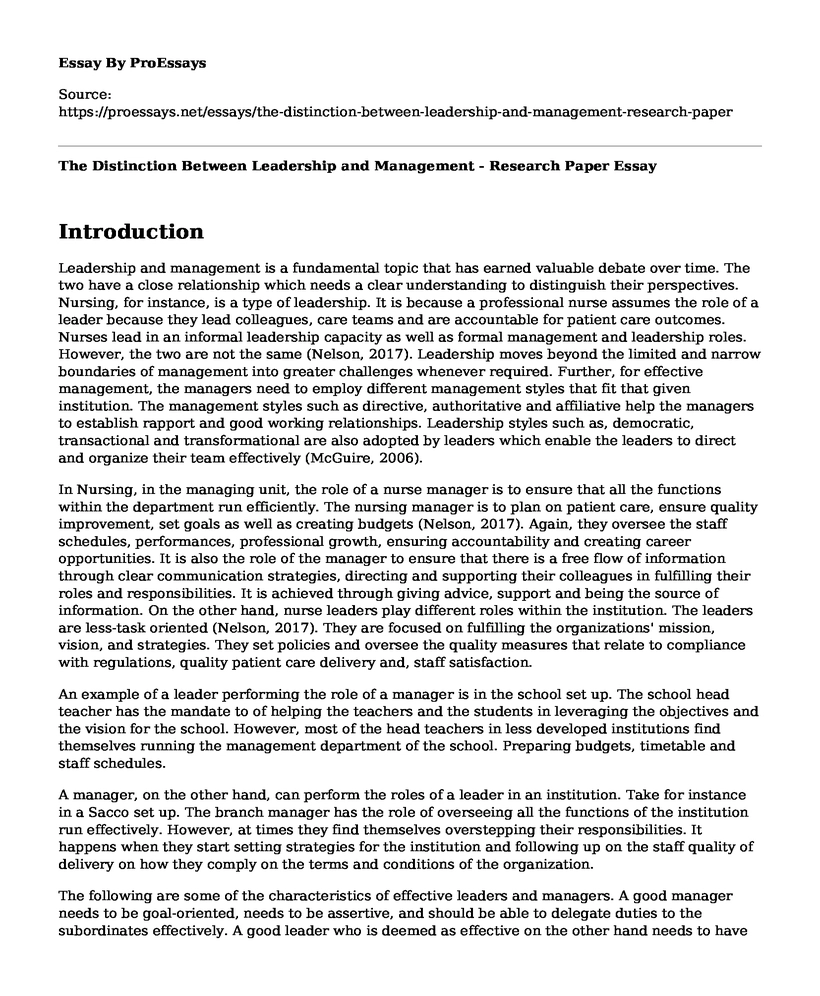Introduction
Leadership and management is a fundamental topic that has earned valuable debate over time. The two have a close relationship which needs a clear understanding to distinguish their perspectives. Nursing, for instance, is a type of leadership. It is because a professional nurse assumes the role of a leader because they lead colleagues, care teams and are accountable for patient care outcomes. Nurses lead in an informal leadership capacity as well as formal management and leadership roles. However, the two are not the same (Nelson, 2017). Leadership moves beyond the limited and narrow boundaries of management into greater challenges whenever required. Further, for effective management, the managers need to employ different management styles that fit that given institution. The management styles such as directive, authoritative and affiliative help the managers to establish rapport and good working relationships. Leadership styles such as, democratic, transactional and transformational are also adopted by leaders which enable the leaders to direct and organize their team effectively (McGuire, 2006).
In Nursing, in the managing unit, the role of a nurse manager is to ensure that all the functions within the department run efficiently. The nursing manager is to plan on patient care, ensure quality improvement, set goals as well as creating budgets (Nelson, 2017). Again, they oversee the staff schedules, performances, professional growth, ensuring accountability and creating career opportunities. It is also the role of the manager to ensure that there is a free flow of information through clear communication strategies, directing and supporting their colleagues in fulfilling their roles and responsibilities. It is achieved through giving advice, support and being the source of information. On the other hand, nurse leaders play different roles within the institution. The leaders are less-task oriented (Nelson, 2017). They are focused on fulfilling the organizations' mission, vision, and strategies. They set policies and oversee the quality measures that relate to compliance with regulations, quality patient care delivery and, staff satisfaction.
An example of a leader performing the role of a manager is in the school set up. The school head teacher has the mandate to of helping the teachers and the students in leveraging the objectives and the vision for the school. However, most of the head teachers in less developed institutions find themselves running the management department of the school. Preparing budgets, timetable and staff schedules.
A manager, on the other hand, can perform the roles of a leader in an institution. Take for instance in a Sacco set up. The branch manager has the role of overseeing all the functions of the institution run effectively. However, at times they find themselves overstepping their responsibilities. It happens when they start setting strategies for the institution and following up on the staff quality of delivery on how they comply on the terms and conditions of the organization.
The following are some of the characteristics of effective leaders and managers. A good manager needs to be goal-oriented, needs to be assertive, and should be able to delegate duties to the subordinates effectively. A good leader who is deemed as effective on the other hand needs to have the following characteristic (Nagelkerk, J. (2005). They include; clarity in delegating duties, idea generators, they can express their vision of a desirable future in an understandable language, to tackle difficult problems, they are persistent about achieving outcomes among other reasons.
References
McGuire, E., & Kennerly, S. M. (2006). Nurse managers as transformational and transactional leaders. Nursing Economics, 24(4), 179.
Nagelkerk, J. (2005). Leadership and nursing care management. Elsevier Health Sciences.
Nelson, K. (2017). Nurse Manager Perceptions of Work Overload and Strategies to Address It. Nurse Leader, 15(6), 406-408. doi: 10.1016/j.mnl.2017.09.009
Smeltzer, S. C., & Bare, B. G. (1992). Brunner & Suddarth's textbook of medical-surgical nursing. Philadelphia: JB Lippincott.
Cite this page
The Distinction Between Leadership and Management - Research Paper. (2022, Dec 20). Retrieved from https://proessays.net/essays/the-distinction-between-leadership-and-management-research-paper
If you are the original author of this essay and no longer wish to have it published on the ProEssays website, please click below to request its removal:
- Key to Leading Change in Today's Environment
- Essay Sample on Respect and Admiration in Business
- Transformational Leadership Paper Example
- Essay Sample on Leadership and Management Behaviors
- Essay on Student Affairs: Broadening Functional Areas for Student Success
- Essay Example on Cultivating an Ethical Organization: Benefits of Establishing a Code of Ethics
- Paper Example on IT Governance: A Key to Success in Online Retail Business







